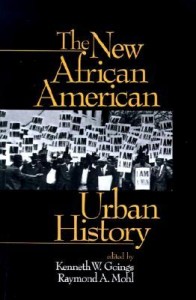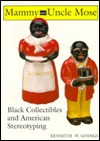The New African American Urban History
http://www.goodreads.com/book/show/2482643.The_New_African_American_Urban_History
The New African American Urban History by Kenneth W. Goings (Editor)
 While earlier studies often portrayed African Americans as passive or powerless, as victims of white racism or slum pathologies, this book emphasizes new scholarship which conveys a sense of active involvement, of people empowered, engaged in struggle, living their lives in dignity and shaping their own futures. These ten essays written by prominent scholars, are synergetic in their common thematic approaches and interpretive analyses, with emphasis on the importance of agency among African Americans – an interpretive thrust that has shaped new writing in the field in the past decade.
While earlier studies often portrayed African Americans as passive or powerless, as victims of white racism or slum pathologies, this book emphasizes new scholarship which conveys a sense of active involvement, of people empowered, engaged in struggle, living their lives in dignity and shaping their own futures. These ten essays written by prominent scholars, are synergetic in their common thematic approaches and interpretive analyses, with emphasis on the importance of agency among African Americans – an interpretive thrust that has shaped new writing in the field in the past decade.
Mammy and Uncle Mose: Black Collectibles and American Stereotyping by Kenneth W. Goings
 Mammy and Uncle Mose examines the production and consumption of black collectibles and memorabilia from the 1880’s to the late 1950’s. Black collectibles – objects made in or with the image of a black person – were everyday items such as advertising cards, housewares (salt and pepper shakers, cookie jars, spoon rests, etc.), toys and games, postcards, souvenirs, and decorative knick-knacks. These objects were almost universally derogatory, with racially exaggerated features that helped “prove” that African Americans were “different” and “inferior.” These items of material culture were props that helped reinforce the “new” racist ideology that began emerging after Reconstruction. Then, as the nation changed, the images created of black people by white people changed. From the 1880’s to the 1930’s, black people were portrayed as very dark, bug-eyed, nappy-headed, childlike, stupid, lazy, deferential – but happy! From the 1930’s to the late 1950’s, racial attitudes shifted again: African Americans, while still portrayed as happy servants, had “brighter” skin tones, and images of black women were slimmed down. By contextualizing “black collectibles” within America’s complex social history, Kenneth W. Goings has opened a fascinating perspective on American history.
Mammy and Uncle Mose examines the production and consumption of black collectibles and memorabilia from the 1880’s to the late 1950’s. Black collectibles – objects made in or with the image of a black person – were everyday items such as advertising cards, housewares (salt and pepper shakers, cookie jars, spoon rests, etc.), toys and games, postcards, souvenirs, and decorative knick-knacks. These objects were almost universally derogatory, with racially exaggerated features that helped “prove” that African Americans were “different” and “inferior.” These items of material culture were props that helped reinforce the “new” racist ideology that began emerging after Reconstruction. Then, as the nation changed, the images created of black people by white people changed. From the 1880’s to the 1930’s, black people were portrayed as very dark, bug-eyed, nappy-headed, childlike, stupid, lazy, deferential – but happy! From the 1930’s to the late 1950’s, racial attitudes shifted again: African Americans, while still portrayed as happy servants, had “brighter” skin tones, and images of black women were slimmed down. By contextualizing “black collectibles” within America’s complex social history, Kenneth W. Goings has opened a fascinating perspective on American history.

